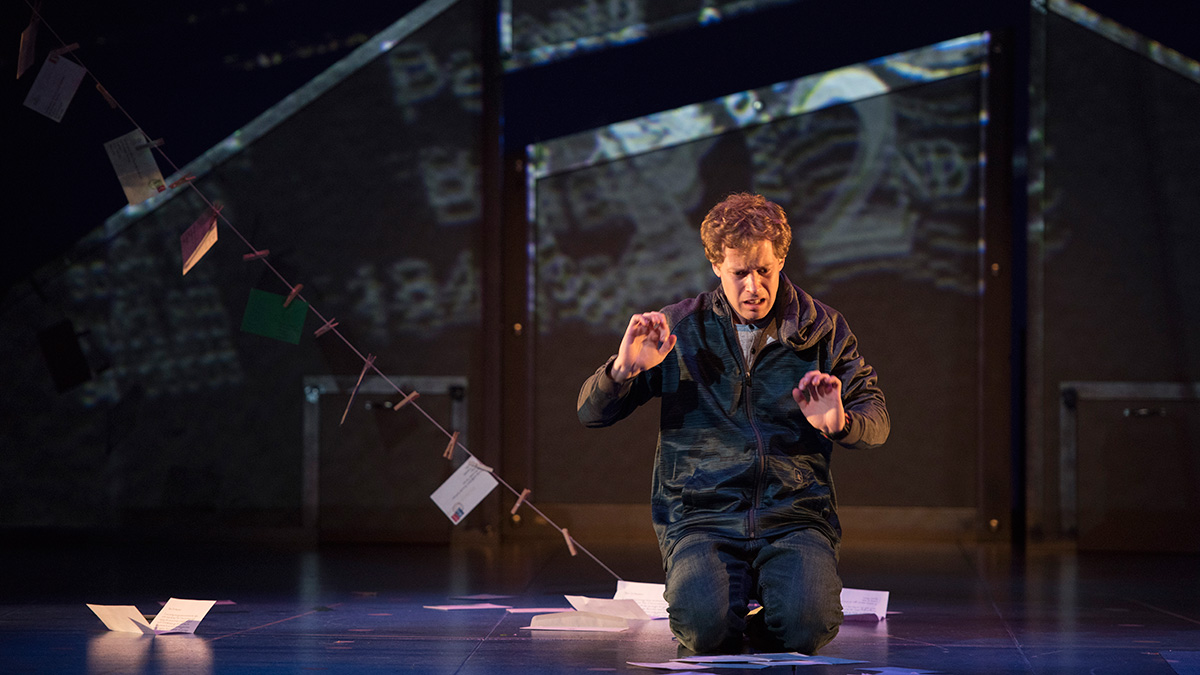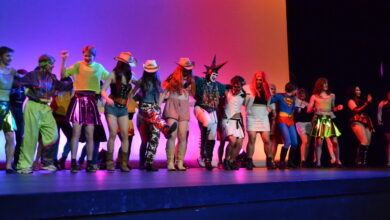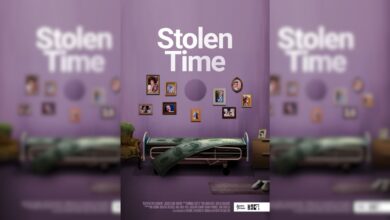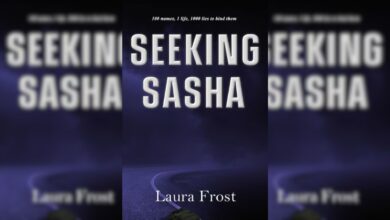‘The Curious Incident of the Dog in the Night-Time’ leaves audiences moved to laughter and tears
 Image Courtesy of David Cooper
Image Courtesy of David CooperThe Curious Incident of the Dog in the Night-Time
When: September 17 – October 9
Where: Citadel Theatre
Book written by: Mark Haddon
Adaptation by: Simon Stephens
Directed by: Heidi Malazdrewich
Tickets: Starting at $30
At the Citadel last Tuesday night, elderly women in their Sunday best, die-hard theatre-goers, and those hip kids from my Philosophy class all came together and shared the experience of being a 15-year-old autistic boy for two hours. That’s the beauty of The Curious Incident of the Dog in the Night-Time. It’s impossible not to feel a connection with the actors, as well as your fellow audience members, while watching young Christopher Boone navigate busy London streets, ace his A-level exams, and grapple with the complexities of his family life.
The Curious Incident of the Dog in the Night-Time is Simon Stephens’ adaptation of Mark Haddon’s internationally renowned novel of the same name, and runs until October 9th at the Citadel Theatre. The story centres around Christopher Boone, a 15-year-old math genius and amateur detective who, although it is never explicitly stated, is somewhere on the autism spectrum. Haddon has been careful to point out, however, that this isn’t a story about autism; it is a story about otherness, loneliness, and being different.
Though every intricacy of a novel can’t be captured onstage, this adaptation preserves its heart — namely, Christopher himself. Edmund Stapleton plays Christopher with sensitivity, honesty, and a good sense of humour. Much of the first act, however, is narrated by a secondary character — Christopher’s teacher Siobhan — as she reads from his journal. Hearing Christopher’s voice from someone other than Christopher himself was distracting, and at the intermission I was worried that the whole play would be a live voiceover from Siobhan. Instead, the second act shifts to Christopher telling his own story.
Playing Christopher comes with the challenge of realistically and thoughtfully portraying an autistic boy, which Stapleton does so heartbreakingly well. His performance alone demands a variety of reactions from audiences. I could hear the woman next to me choking on a sob each time Christopher curled up and hid from the world. And the whole audience was roaring with laughter when Christopher explained how human behaviour confused him: “raising one eyebrow could mean they want to do the sex, or not.”
Perhaps the most powerful scenes were those in which Christopher becomes overwhelmed by his surroundings. In the opening scene, all the actors tapped their hands on their thighs as a peripheral depiction of Christopher’s anxiety. This support from the ensemble, and the use of projection and sound help to build the tension along with Stapleton’s performance makes these moments truly memorable.
The depth of the characters really stands out. Mrs. Boone is caring, independent, yet a little reckless. Despite his temper, Mr. Boone is loving. Every fictional character becomes a real human being with histories and dreams and skeletons in their closets — although Christopher, who has no patience for metaphors, would probably say otherwise.
Whether you’re there because you loved the book, because your Drama-major friend dragged you there, or because you heard that there’s a tiny, beautiful Golden Retriever puppy onstage (yes, there is), The Curious Incident of the Dog in the Night-Time will not disappoint you. From the lively introduction by the newly christened Artistic Director of the Citadel Daryl Cloran, to the Pythagorean theorem demonstration done with the use of strobe lights and confetti after the curtain call, I was moved to both laughter and tears.





I’m an autistic person who uses Google Alerts to check how often people claim that The Curious Incident of the Dog in the Night-Time is an accurate representation of the condition.
This article is one of the better ones I’ve seen covering this play, and I particularly appreciate the summary of Haddon’s position.You can see the source blog post at goo.gl/idNGz4. I personally find it disingenuous – if he really meant it he wouldn’t have said six years after the book was published and if he meant for his readership to be aware of his view he’d have the post inserted into his novel as a foreword. And his glib phrase ‘imagination always trumps research’ makes me want tear my hair out.
I should mention that Penny Ritco, executive director of the people behind this version of the show, explicitly says that their Christopher isn’t autistic in this email goo.gl/Iphk4G. I have a great deal of respect for the honesty and bluntness of her position. The National Theatre peddle a waffley line that says that since Christopher never defines his condition beyond using the phrase ‘Behavioural Conditions’ the audience can define him however they want goo.gl/u4GnlS. This I find difficult to take seriously, as the word ‘autism’ features prominently on their site. The Auckland Production takes a similar stance goo.gl/FDU8Cd, although given that I haven’t seen the word autism in their production materials, I think they actually meant it.
I have a good reason to be so investigative about Curious Incident – Christopher Boone embodies some of the most harmful myths about autism in that he’s violent, unempathic and his very existence dissolves his parents marriage. Imagine going to a job interview and being unable to explain to your interviewer why you have trouble with eye contact, because the moment you say ‘Asperger’s Syndrome’, the image of a teenager waving a knife at a train station will come into their head. Misleading stereotypes spread by media like Curious Incident makes it harder for autistics like me to be honest about why I act the way I do, as well as fuel employment discrimination and school bullying. I’m far from the only autistic wary of Curious Incident – I’ve collected a number of useful links to autistics complaining about it in this pamphlet I’m spruiking around the internet like some sort of Neurodiversity Jehovah’s Witness goo.gl/cD0NCm.
While I would happily erase all iterations of Curious Incident from reality, my advice to anyone who must see this show is to remember that it will teach them nothing about autism. Anyone writing about the show should mention Mark Haddon’s 2009 statement, like this article does, and to at least mention how actually autistic people have reacted to the story. Whenever you discuss Curious Incident you must consider the perspectives of real autistics – show us some of that marvelous neurotypical empathy Simon Baron-Cohen told us so much about!